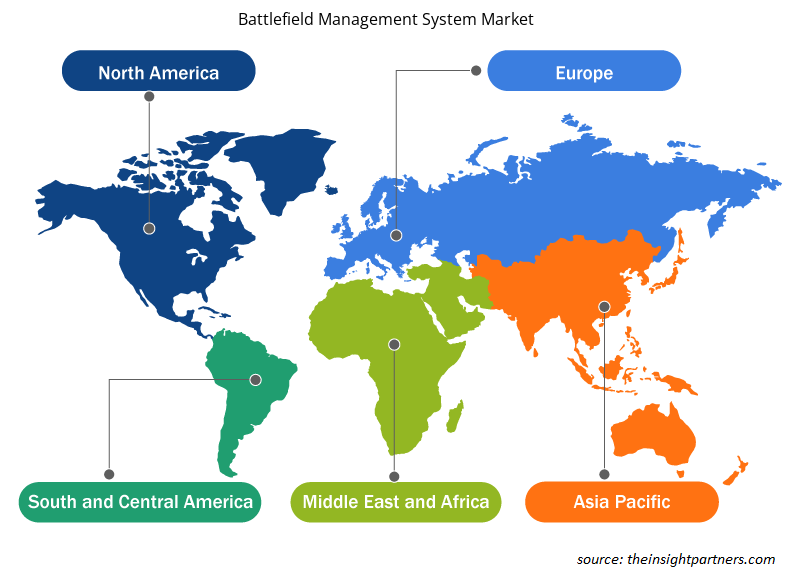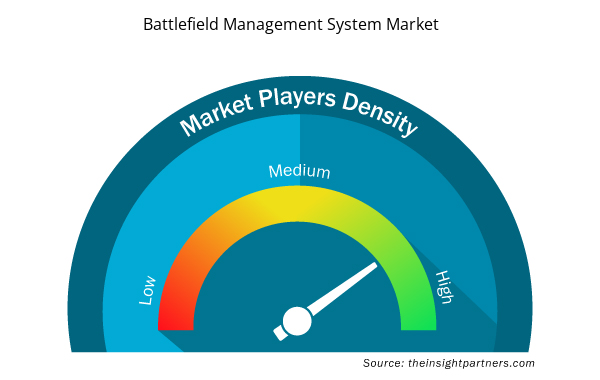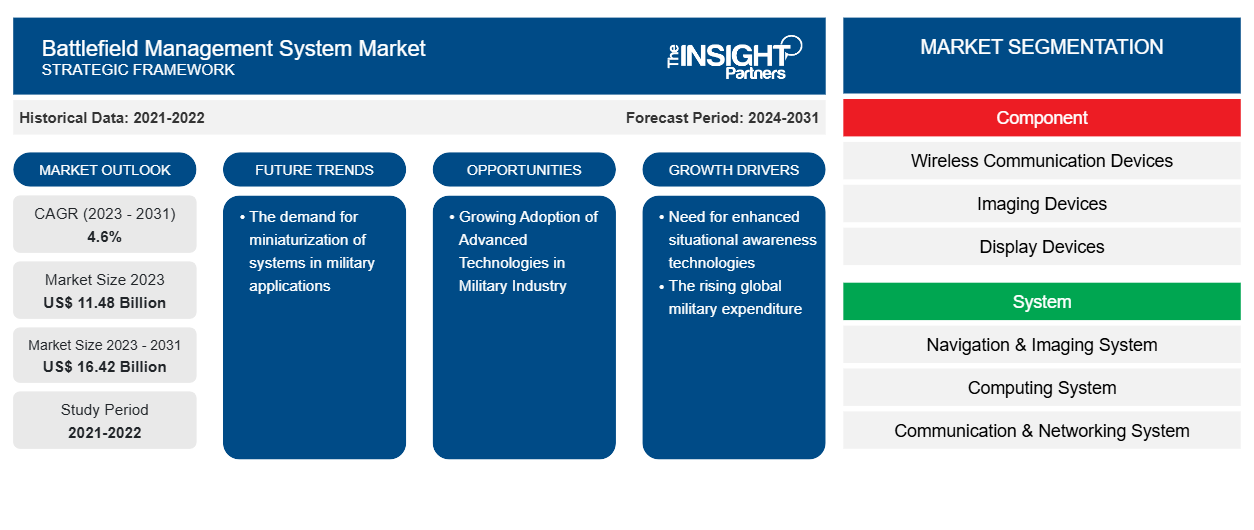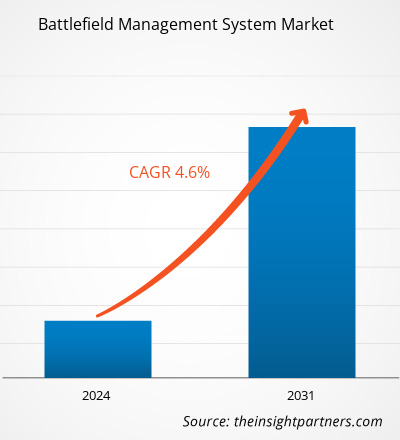战场管理系统市场规模预计将从 2023 年的 114.8 亿美元增至 2031 年的 164.2 亿美元。预计 2023-2031 年期间市场复合年增长率将达到 4.6%。军事应用对系统小型化的需求可能仍是市场的主要趋势。
战场管理系统市场分析
市场主要包括软件开发商、系统开发商、系统集成商和最终用户。市场参与者主要由软件开发商组成,例如 Atos、Systematic 和 Rolta,他们通过自己的技术专长提供基于软件的战场管理解决方案。系统开发商是硬件制造商,他们是这个市场的先行者,因为他们与不同的军队取得了联系。软件开发商和系统开发商以同步的方式运作。一旦系统和软件开发完成,系统开发商就会将解决方案传递给系统集成商,系统集成商最终将软件集成到系统中,然后将 BMS 交付给武装部队。各种系统开发商也作为系统集成商运作,并直接向最终用户提供整个系统。最终用户包括世界各地的各种武装部队,代表了市场的需求方。
战场管理系统市场概览
目前,战场管理系统市场由拥有大量客户群的大型成熟市场参与者组成。此外,较高的进入门槛以及政府倾向于奖励之前的长期业务合作,也导致新进入者进入战场管理系统市场的威胁较低。然而,最近的预算削减以及对优质物流规划、管理和运营的需求激增预计将缓解某些物流产品的障碍。例如,未来几年,增强物流相关服务的机会(如咨询、优化、先进技术的集成和支持以及物流支持)预计将提供中等的进入门槛。
定制此报告以满足您的需求
您可以免费定制任何报告,包括本报告的部分内容、国家级分析、Excel 数据包,以及为初创企业和大学提供优惠和折扣
- 获取此报告的关键市场趋势。这个免费样品将包括数据分析,从市场趋势到估计和预测。
战场管理系统市场驱动因素和机遇
需要增强态势感知技术
在战斗中,态势感知或位置感知至关重要。战场对态势感知提出了多项挑战,这对下马士兵和车辆构成了重大威胁。这是因为敌人或武装力量正在使用先进技术,这给武装部队的决策带来了挑战。BMS 的主要目标是通过帮助士兵快速思考和行动,以有效的方式克服这些挑战。BMS 被认为可以提高态势感知能力,特别是在敌人可追溯性较低的情况下。它有助于识别和理解有关团队活动的关键信息要素,尤其是战场活动。
军事工业越来越多地采用先进技术
全球军事部门正致力于通过多项技术进步来提高其陆、空和海军能力。跨境活动的增加和不可避免的跨境情况需要先进的技术系统。人工智能 (AI) 与武器、无人机和其他产品相结合,在军事领域发挥着重要作用。人工智能研究正在情报收集和分析、指挥和控制以及各种车辆领域进行,并已被纳入叙利亚和伊拉克的军事行动。中国正押注人工智能来优化其国防能力,预计到 2030 年将成为人工智能领域的世界领先者。目前,他们专注于使用人工智能做出明智和更快的决策,并建造各种自主军用车辆。俄罗斯也在积极将人工智能融入军事技术,重点关注机器人技术。这些因素可能会在未来几年提供未来的机会。
战场管理系统市场报告细分分析
有助于战场管理系统市场分析的关键部分是组件、系统和应用程序。
- 根据组件,战场管理系统市场细分为无线通信设备、成像设备、显示设备、计算机软件和跟踪设备。无线通信设备部门在 2023 年占据了更大的市场份额。
- 根据系统,战场管理系统市场细分为导航和成像系统、计算系统以及通信和网络系统。通信和网络系统部门在 2023 年占据了更大的市场份额。
- 根据应用,战场管理系统市场分为车辆、士兵和指挥部。指挥部部分在 2023 年占据了更大的市场份额。
战场管理系统市场份额按地区分析
战场管理系统市场报告的地理范围主要分为五个区域:北美、欧洲、亚太、中东和非洲、南美。
2023 年,北美占据了市场主导地位,其次是欧洲和亚太地区。此外,亚太地区在未来几年也可能出现最高的复合年增长率。美国在 2023 年主导了北美战场管理系统市场。这是因为美国是军事支出最大的国家,也是战场管理系统市场中一些主要参与者的组成部分。在北美战场管理系统市场占有一席之地的一些主要参与者包括 BAE Systems Plc、通用动力公司、雷神技术公司、L3Harris Technologies Inc、洛克希德马丁公司和诺斯罗普格鲁曼公司等供应商。
战场管理系统市场报告范围
战场管理系统市场区域洞察
Insight Partners 的分析师已详细解释了预测期内影响战场管理系统市场的区域趋势和因素。本节还讨论了战场管理系统市场的各个部分和地理位置,包括北美、欧洲、亚太地区、中东和非洲以及南美和中美洲。

- 获取战场管理系统市场的区域特定数据
战场管理系统市场报告范围
| 报告属性 | 细节 |
|---|---|
| 2023 年的市场规模 | 114.8亿美元 |
| 2031 年市场规模 | 164.2亿美元 |
| 全球复合年增长率(2023 - 2031) | 4.6% |
| 史料 | 2021-2022 |
| 预测期 | 2024-2031 |
| 涵盖的领域 | 按组件
|
| 覆盖地区和国家 | 北美
|
| 市场领导者和主要公司简介 |
|
战场管理系统市场参与者密度:了解其对业务动态的影响
战场管理系统市场正在快速增长,这得益于最终用户需求的不断增长,这些需求源于消费者偏好的不断变化、技术进步以及对产品优势的认识不断提高等因素。随着需求的增加,企业正在扩大其产品范围,进行创新以满足消费者需求,并利用新兴趋势,从而进一步推动市场增长。
市场参与者密度是指在特定市场或行业内运营的企业或公司的分布情况。它表明在给定市场空间中,相对于其规模或总市场价值,有多少竞争对手(市场参与者)存在。
在战场管理系统市场运营的主要公司有:
- 英国航宇系统公司
- 埃尔比特系统有限公司
- 通用动力公司
- L3Harris技术公司
- 莱昂纳多公司
- 雷神技术公司
免责声明:上面列出的公司没有按照任何特定顺序排列。

- 获取战场管理系统市场顶级关键参与者概览
战场管理系统市场新闻和最新发展
战场管理系统市场通过收集一手和二手研究后的定性和定量数据进行评估,其中包括重要的公司出版物、协会数据和数据库。战场管理系统市场的一些发展如下所列:
- 洛克希德马丁澳大利亚公司与国防部签署了一项具有里程碑意义的 5 亿澳元合同,以建立澳大利亚未来的联合空战管理系统,该项目为 AIR6500 第一阶段 (AIR6500-1)。该系统将利用下一代技术为国防部提供先进的综合防空和导弹防御能力,以对抗高速威胁。(来源:洛克希德马丁公司,新闻稿,2024 年 4 月)
- 国防部 (MOD) 已授予 BAE Systems 一份价值 8900 万英镑的合同,以增强军事人员的前线连通性,连接小型侦察无人机、作战车辆、战斗机、航空母舰和军事指挥部。(来源:BAE Systems Plc,新闻稿,2023 年 8 月)
战场管理系统市场报告覆盖范围和交付成果
“战场管理系统市场规模和预测(2021-2031)”报告对以下领域进行了详细的市场分析:
- 战场管理系统市场规模及全球、地区和国家层面所有关键细分市场的预测
- 战场管理系统市场趋势以及市场动态,如驱动因素、限制因素和关键机遇
- 详细的波特五力分析
- 战场管理系统市场分析涵盖主要市场趋势、全球和区域框架、主要参与者、法规和最新市场发展
- 行业格局和竞争分析,涵盖市场集中度、热图分析、知名参与者以及战场管理系统市场的最新发展
- 详细的公司简介
- 历史分析(2 年)、基准年、预测(7 年)及复合年增长率
- PEST 和 SWOT 分析
- 市场规模价值/数量 - 全球、区域、国家
- 行业和竞争格局
- Excel 数据集



Report Coverage
Revenue forecast, Company Analysis, Industry landscape, Growth factors, and Trends

Segment Covered
This text is related
to segments covered.

Regional Scope
North America, Europe, Asia Pacific, Middle East & Africa, South & Central America

Country Scope
This text is related
to country scope.
常见问题
North America region dominated the battlefield management system market in 2023.
Need for enhanced situational awareness technologies and the rising global military expenditure are some of the factors driving the growth for battlefield management system market.
The demand for miniaturization of systems in military applications is one of the major trends of the market.
BAE Systems Plc, Elbit Systems Ltd, General Dynamics Corporation, L3Harris Technologies Inc, Leonardo SpA, Raytheon Technologies Corporation, Rheinmetall AG, Lockheed Martin Corporation, SAAB AB, and Thales Group are some of the key players profiled under the report.
The estimated value of the battlefield management system market by 2031 would be around US$ 16.42 billion.
The battlefield management system market is likely to register 4.6% during 2023-2031.
Trends and growth analysis reports related to Aerospace and Defense : READ MORE..
The Insight Partners performs research in 4 major stages: Data Collection & Secondary Research, Primary Research, Data Analysis and Data Triangulation & Final Review.
- Data Collection and Secondary Research:
As a market research and consulting firm operating from a decade, we have published and advised several client across the globe. First step for any study will start with an assessment of currently available data and insights from existing reports. Further, historical and current market information is collected from Investor Presentations, Annual Reports, SEC Filings, etc., and other information related to company’s performance and market positioning are gathered from Paid Databases (Factiva, Hoovers, and Reuters) and various other publications available in public domain.
Several associations trade associates, technical forums, institutes, societies and organization are accessed to gain technical as well as market related insights through their publications such as research papers, blogs and press releases related to the studies are referred to get cues about the market. Further, white papers, journals, magazines, and other news articles published in last 3 years are scrutinized and analyzed to understand the current market trends.
- Primary Research:
The primarily interview analysis comprise of data obtained from industry participants interview and answers to survey questions gathered by in-house primary team.
For primary research, interviews are conducted with industry experts/CEOs/Marketing Managers/VPs/Subject Matter Experts from both demand and supply side to get a 360-degree view of the market. The primary team conducts several interviews based on the complexity of the markets to understand the various market trends and dynamics which makes research more credible and precise.
A typical research interview fulfils the following functions:
- Provides first-hand information on the market size, market trends, growth trends, competitive landscape, and outlook
- Validates and strengthens in-house secondary research findings
- Develops the analysis team’s expertise and market understanding
Primary research involves email interactions and telephone interviews for each market, category, segment, and sub-segment across geographies. The participants who typically take part in such a process include, but are not limited to:
- Industry participants: VPs, business development managers, market intelligence managers and national sales managers
- Outside experts: Valuation experts, research analysts and key opinion leaders specializing in the electronics and semiconductor industry.
Below is the breakup of our primary respondents by company, designation, and region:

Once we receive the confirmation from primary research sources or primary respondents, we finalize the base year market estimation and forecast the data as per the macroeconomic and microeconomic factors assessed during data collection.
- Data Analysis:
Once data is validated through both secondary as well as primary respondents, we finalize the market estimations by hypothesis formulation and factor analysis at regional and country level.
- Macro-Economic Factor Analysis:
We analyse macroeconomic indicators such the gross domestic product (GDP), increase in the demand for goods and services across industries, technological advancement, regional economic growth, governmental policies, the influence of COVID-19, PEST analysis, and other aspects. This analysis aids in setting benchmarks for various nations/regions and approximating market splits. Additionally, the general trend of the aforementioned components aid in determining the market's development possibilities.
- Country Level Data:
Various factors that are especially aligned to the country are taken into account to determine the market size for a certain area and country, including the presence of vendors, such as headquarters and offices, the country's GDP, demand patterns, and industry growth. To comprehend the market dynamics for the nation, a number of growth variables, inhibitors, application areas, and current market trends are researched. The aforementioned elements aid in determining the country's overall market's growth potential.
- Company Profile:
The “Table of Contents” is formulated by listing and analyzing more than 25 - 30 companies operating in the market ecosystem across geographies. However, we profile only 10 companies as a standard practice in our syndicate reports. These 10 companies comprise leading, emerging, and regional players. Nonetheless, our analysis is not restricted to the 10 listed companies, we also analyze other companies present in the market to develop a holistic view and understand the prevailing trends. The “Company Profiles” section in the report covers key facts, business description, products & services, financial information, SWOT analysis, and key developments. The financial information presented is extracted from the annual reports and official documents of the publicly listed companies. Upon collecting the information for the sections of respective companies, we verify them via various primary sources and then compile the data in respective company profiles. The company level information helps us in deriving the base number as well as in forecasting the market size.
- Developing Base Number:
Aggregation of sales statistics (2020-2022) and macro-economic factor, and other secondary and primary research insights are utilized to arrive at base number and related market shares for 2022. The data gaps are identified in this step and relevant market data is analyzed, collected from paid primary interviews or databases. On finalizing the base year market size, forecasts are developed on the basis of macro-economic, industry and market growth factors and company level analysis.
- Data Triangulation and Final Review:
The market findings and base year market size calculations are validated from supply as well as demand side. Demand side validations are based on macro-economic factor analysis and benchmarks for respective regions and countries. In case of supply side validations, revenues of major companies are estimated (in case not available) based on industry benchmark, approximate number of employees, product portfolio, and primary interviews revenues are gathered. Further revenue from target product/service segment is assessed to avoid overshooting of market statistics. In case of heavy deviations between supply and demand side values, all thes steps are repeated to achieve synchronization.
We follow an iterative model, wherein we share our research findings with Subject Matter Experts (SME’s) and Key Opinion Leaders (KOLs) until consensus view of the market is not formulated – this model negates any drastic deviation in the opinions of experts. Only validated and universally acceptable research findings are quoted in our reports.
We have important check points that we use to validate our research findings – which we call – data triangulation, where we validate the information, we generate from secondary sources with primary interviews and then we re-validate with our internal data bases and Subject matter experts. This comprehensive model enables us to deliver high quality, reliable data in shortest possible time.


 获取此报告的免费样本
获取此报告的免费样本